Peter MALONE
Saturday, 18 September 2021 19:53
Hunger Games, The: Mockingjay Part One
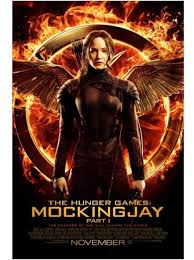
THE HUNGER GAMES: MOCKINGJAY, PART ONE
US, 2014, 123 minutes, Colour.
Jennifer Lawrence, Josh Hutcheson, Liam Hemsworth, Woody Harrelson, Donald Sutherland, Philip Seymour Hoffman, Julianne Moore, Willow Shields, Sam Claflin, Elizabeth Banks, Mahershala Ali, Jena Malone, Jeffrey Wright.
Directed by Francis Lawrence.
After all the excitement of the original Hunger Games and its being renewed in Catching Fire, Mockingjay Part 1 is a very sober affair. It is dark, in story and visually, with a grim perspective. It is an interim film like The Lord of the Rings: The Two Towers and the second part of The Hobbit series, as well as in the breaking of the last story of Harry Potter and in the Twilight films. In some ways it could be considered as a feature length trailer for the final episode.
Gone are the Hunger Games, the dividends in the forests, reportedly dressed television audience, except in the memory. This time, it is rebellion. While President Snow is still in power, and Donald Sutherland is once again sinister and cruel, he has fewer advisors, especially since Plutarch (once again reminding us of the value of the late Philip Seymour Hoffman) has left him and is now adviser to the alternate President, played by Julianne Moore, a strong presence, planning both the attacks as well as the defences in the rebellion and, ultimately, making stirring and rousing speeches.
Katniss, Jennifer Lawrence still impressing us as a strong heroine, is now linked with the rebels, but still unhappy in the fact that Peeta is still imprisoned by President Snow. The young rebels are dismayed by some of his television broadcasts (interviewed by lower-key and less-dapper Stanley Tucci). They consider him a traitor. Not Katniss. She is persuaded to make a video, urging people to the rebellion but she does not impress with the rehearsals. With the appearance of Effie Trinkett and Haymitch (pleasing to see Elizabeth Banks again, though she has to make do with rebel scarves and drab dresses), and Woody Harrelson, (finding a lack of alcohol among the rebels very trying), Katniss is advised to visit some of the bombed districts. Visiting the hospital, seeing the girl and dead, she is very upset and makes an impassioned and very convincing propaganda video.
President Snow sends out another attack force and the rebels go underground. In the meantime, the decision is made for a special squad to go to rescue Peeta and bring him back. Although the mission has some success, again President Snow has sinister intentions
Gale is once again present, going on some of the dangerous missions, devoted to Katniss. She herself is devoted to Peter.
Fans fans will enjoy the film, though in a lower key fashion, Mockingjay Part 1 is a very sober affair, building up in anticipation of the final part of the story and of the series.
1. The fans of the books and the films? The presuppositions of the first films and responses?
2. The change in tone, moving from Games in the outer world and rivalries to the inner world and rebellion and siege? Rescue? The focus on the rebels and not on the Capital? A grimmer look, not gaudy like that of the crowds in the Capital?
3. The transition, Katniss and Peeta and the rebellion? Plutarch’s plans, President Coin, the rebels, Gale and his presence, the military attack, the bombings, the exhortation to the future? The film serving as a trailer for the final part?
4. The situation? The area? Kattnis and Gale? The family? President Coin in the assembly, the sentiment communications, sophisticated, weapons and surveillance? Katniss as Mockingjay? The plan to film for propaganda, her not being spontaneous, Haymitch and advice for her to go into action? The crew, the director, the sound engineer, the photographers? Gale and his presence? Katniss and her going to the district, the bombing destruction, the hospital, the wounded, her speech? Filming in anger and sadness? The president and the decisions? The experience of the bombing, the playing the propaganda films by Katniss?
5. Katniss, going home, finding the cat, the photo of her father, the family in the shelter, bringing home the cat, the sister’s delight, bonding with her mother? During the bombardments? Having to go back to get Primrose and the cat? Primrose training to be a doctor?
6. President Snow, speeches, the assistance and advice, his ruthlessness, the decision to bomb the hospital? His being denounced by Finnick, his depravity, sexual exploitation, the use of poison, the wounds in his own mouth, the antidotes? Keeping his attention so that the rescue mission could go on, Katniss keeping his focus, his revelation that he knew about the raid, letting them escape, Peter being tortured and to be used as a weapon on his return?
7. Peeta, the television interviews, the low-key presentation of the interrogator? Peeta’s words, urging peace, being denounced as a traitor? His final warning, allowing time for evacuating civilians? His being rescued, the return, his mental state, his attack on Katniss, the explanations that he was a weapon?
8. The return of Effie Trinket, her loss of fashion, at one with the rebels, uncomfortable, contributing, directing Katniss for her presentation, clothes? Her creative making do with the variety of fashion with scarves?
9. Haymitch and his return, sober, his advice for Katniss, for her being filmed in action? His help with the rebels?
10. Plutarch, his past experience with President as an advisor to President Coin, the nature of his advice, his personal fears, the bombardment?
11. Katniss, the softer side, tears, fear, for her family, her love for Peeta, gratitude to Gale?
12. The rescue mission, Gale going, Boggs, his role and his being present, active? Beetee and his controls, his skills? Success?
13. The final exhortation by the President – as a trailer for the final part of the series?
Published in Movie Reviews
Published in
Movie Reviews
Tagged under
Saturday, 18 September 2021 19:53
My Mistress
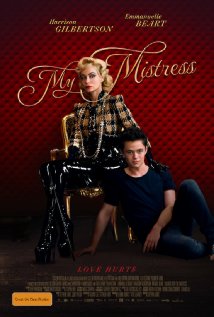
MY MISTRESS
Australia, 2014, 104 minutes, Colour.
Harrison Gilbertson, Emmanuelle Beart, Rachael Blake, Socratis Otto.
Directed by Stephen Lance.
The use of the term “mistress” suggests a sexual theme. But, it is not quite the theme or treatment that we might have anticipated.
First of all, this is a story set in Queensland, in the suburbs. The “my” of the title is a 16-year-old boy, Charlie (Harrison Gilbertson). We first see him jumping on the top of an old car, smoking, having a drink, riding his bike home. A teenager story?
Then, almost immediately, he finds his father hanging in the garage and having to cut him down, going into a party in the house, a crowd with loud music, to tell his mother (Rachael Blake). Throughout the film, the plot focuses on this relationship between son and mother, quite tense, Charlie developing a hostility to his mother, his mother concerned and frustrated.
But, on the way home on his bike, he has noticed a woman moving into a house and her impatience with the removalists. Later, he goes to the house out of curiosity, goes inside and he, and we, perhaps, are rather shocked to find that the “mistress” of the title is a dominatrix. She is played by French actress, Emmanuelle Beart.
Over the years, there have been several serious Australian films about sexuality, including some of the more perverse aspects, like Sleeping Beauty. This film is different, looking at the reactions of the teenager, especially after the bereavement of his father’s death, his visists to the house, his growing infatuation with the dominatrix, who has the down-to-earth name, Maggie. He gets a job working in her garden, though she lays down strict conditions. But, he is impressionable and vulnerable, fantasises about her at home, is curious about her clients.
With sado-masochism in the suburbs, it is a bit hard to take it all, chambers and whips, all that seriously. There is a key scene where Maggie hides Charlie in a coffin with a peephole while she dominates a client with humiliating behaviour. Charlie gets the giggles. Which means that while the film highlights the seriousness as we look at what goes on, it often seems quite ludicrous. Maggie’s comment to Charlie is that this experience is not what the client wants but what the client needs.
When it is revealed that Maggie has a little boy who is in foster care, the film takes on a much more human dimension. As Charlie becomes more and more involved, even driving Maggie to see her little boy, we wonder what will and can become of this relationship. Maggie has a lot of genuine feelings, is sympathetic to Charlie, but the relationship must come to an end.
Harrison Gilbertson acts well, giving some credibility to Charlie and his feelings, his understanding and lack of understanding, his dilemmas as a schoolboy. Emmanuelle Beart has portrayed somewhat similar characters in French films, but her character is not really explained, especially how and why she is in Queensland and who set her up in the house. Maybe these are distractions to the main emphasis of the film, but some explanation would add to the credibility of characters and plot.
While there are a couple of sado-masochistic scenes, the film is rather restrained, visually, leaving some aspects to the imagination of the audience. In an era when young people are exposed to sexual behaviour, reinforced by material available on the Internet, My Mistress does raise some questions about the effect on young people, and for the future.
1. Variation on the sado-masochist theme, the dominatrix? In the Australian suburbs?
2. Queensland, the bright sunshine, the rain, the streets, the parks, playgrounds, homes, the mansion, the pool? Interiors of homes? The mansion for the dominatrix? The feel of Queensland? The musical score?
3. The title, from Charlie’s point of view, the dominatrix and her equipment, the clients, the scenes of punishment, the touch of the ludicrous? The punishment being “what they need, rather than what they want”?
4. Emmanuelle Beart, her career, her roles, French background, beauty, in Australia, no explanations, speaking French, her son, moving into the mansion, setting up the house of torture, the scenes of her clients, the treatment? Leon and his control over Maggie? Her being a teacher, seeing her boy, the situation with him in care, the personnel and care, discussions with Maggie, the story of the accident, attempted suicide? Her hopes for her son?
5. Charlie, seeing him smoking, drinking, jumping on the car, riding his bike, the sounds of the party in the house, the difficulties in getting into the garage, finding his father hanging, cutting him down? His slow motion through the room, sitting, his mother coming to him? The funeral, the grief, seeing his mother kiss the neighbour, visual action?
6. Seeing Maggie and her unpacking, her impatience? His going to the house, getting in, seeing the client, shock? Applying for the job? Maggie’s conditions? The visits, the growing infatuation, her response? His being punished, the whip? His mother seeing his shoulders? Maggie’s advice to have the cold shower, the whiskey, incantation, giving his body? The masturbation scene in the shower, his sado-masochist fantasy? Growing curiosity, his work, lying by the pool, talking with Maggie, the proper cup of tea and her demands? His driving her to see her son? Playing computer games, drinking? The effect on him? Throwing of furniture into the pool? Going to the room, the sexual encounter – reticent in its visuals? Leon’s arrival, the clash, the fight, Maggie and her whip?
7. His mother, her concern, talking to her son, the visit to Maggie and the threats? Charlie and his hate for his mother, getting the psychologist, no response? The photos on the table, telling Charlie that he should leave, take what he wanted, return when he could? Sitting with photos, weeping, reconciliation with his mother?
8. The final meeting with Maggie, their agreement not to see each other?
9. Later in the park, playing with her son? Charlie and the school run?
10. A teenager dealing with grief, his father’s suicide, blaming himself? The infatuation with Maggie, the sado-masochism, his finding it funny (his watching the episode while in the coffin? Love and infatuation, having to leave, a film broader in scope than its title might have suggested?
Published in Movie Reviews
Published in
Movie Reviews
Tagged under
Saturday, 18 September 2021 19:53
My Old Lady
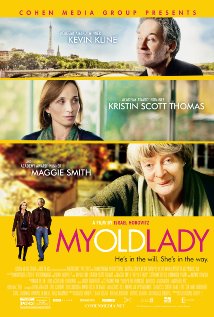
MY OLD LADY
UK/France/US, 2014, 107 minutes, Colour.
Kevin Kline, Maggie Smith, Kristin Scott Thomas, Dominique Pignon, Noemie Lvovsky.
Directed by Israel Horovitz.
Not a very helpful title. Yet, it is the title of the play by the writer-director of this film. It sounds too slangy, offhand, perhaps indicating a more comic tone than is the reality.
The setting is Paris. Maggie Smith portrays a 92-year-old widow who lives in an old-fashioned apartment. Suddenly, a man in his late 50s, Mathias, played by Kevin Kline, turns up and starts searching the building. It seems that he has inherited this from his father, a man with whom he could never bond, whom he felt was always putting him down. Pleased that he now has some property, especially since he is broke, has had three wives, has had a drinking problem, he is almost instantly disillusioned – the arrangement his father had made with Madame, with whom he had a liaison long since, was that Madame could stay and, according to a seemingly odd French law, she would be paid to stay there. When he explains that he would like to stay, she tells him that he would have to pay her rent as well is the subsidy for her living there.
What is he to do? Well, he takes a lot of photos of the house and off he goes to a real estate agent to find out its value were he to sell. Then he takes photos of the furniture and hawks them down at a local shop.
There is no telling what he might do when he pops open the bathroom door only to find Madame’s daughter, Chloe, occupying it. They do not get off to a good start.
The film is even more serious when Mathias discovers that his father had the long liaison with Madame, that her husband knew about the relationship and went off to Africa hunting, Mathias finding a lot of heads mounted in the room he occupies. Chloe reveals that she too knew of the relationship. Mathias is dismayed, especially in his memories of his mother and her depression.
When Mathias approaches a buyer for the apartment, inviting him when he has lunch with Chloe and she becomes upset, we seem to see the direction in which the film might go. But, it doesn’t. In his bewilderment, Matthias takes to the bottle again. He discusses the situation in the past with Chloe, which brings them to some kind of understanding and peacemaking.
Part of the enjoyment of the film is listening to the dialogue, as the film is clearly based on a play and is quite theatrical in the amount of talking and discussing, the setting up of scenes inside the house, outside in the garden, as well as the visits to the shops and agents, and in interlude when Mathias sees a young woman singing opera arias and, as the cloud seemed to be lifting from his seemingly gloomy life and he joins in the singing of the banks of the Seine.
Maggie Smith is completely convincing as the 92-year-old Madame, still astute, still sharp of wit and, from her own experiences, rather tolerant of others. Kristin Scott Thomas plays Chloe. She is an actress who can play a plain-looking woman with conviction and can transform her appearance into a woman of plain beauty. Kevin Kline obviously relishes acting with Maggie Smith and Kristin Scott Thomas.
While there are a number of moral surprises, taken a bit more lightly by the French than those of the Anglo-Saxon? and Irish perspectives, there is more depth to the story and the characters than we might have anticipated.
There are two interludes during and at the end of the credits.
1. The title and its tone? Too much slang? Belying the seriousness of the characters and themes?
2. The film based on the play, structure, acts and scenes, the strong emphasis on dialogue? Musical score?
3. French story, the tone, characters, personal lives, sexual relationships, adultery, consequences?
4. Paris, the apartment and the interiors, the garden, the sights of Paris, the same, the opera singer and Matthias joining in, the shops, real estate agents? Authentic feeling?
5. Matthias, his situation, Kevin Kline’s presence, his nickname Jim? Broke, his arrival in Paris, his inheritance, searching the apartment and audience curiosity roused? Madame, waking suddenly, the meeting, talking, Matthias and his father, the gift turning out to be a burden, French law and the Viaje, paying the resident? Matthias wanting to stay? Having to pay rent? His disillusionment, especially with his unloving father?
6. Staying in the room, the encounter and Chloe in the toilet, the prickly relationship? his taking photos of the objects in the house? His going to the shop, bargaining, selling the chairs and table? His going to the estate agent, their discussions, getting information about prices? The buyer, making contact, at the meal with Chloe?
7. Madame, teaching English, the doctor in the class? Matthias going to see the doctor and discussions about Madame’s health?
8. Chloe, her age, experience, staying with her mother, her devotion, memories of her father, the Hunter, knowing about the affair when she was ten, Matthias and his challenge to her relationship with a married man, going to his apartment, encountering the wife, breaking the relationship?
9. Matthias’s story, three wives, many suicide attempts, his father and no affirmation for him? His only discovering the thing when talking to Madame? His mother, the gun, shooting herself? Madame not knowing of this?
10. Matthias and his drinking, anger, drinking again, the discussions, Madame and the truth, Madame and her lies? Her declarations about her relationship, love and the consequences?
11. Chloe, her father, knowing of the affair at ten years old? His hunting, the animals in the room, the range of guns? Matthias checking the guns – the possibility of suicide?
12. Madame, Chloe, the photos, with Chloe as a young child? The truth, their sharing, the kiss, the sexual encounter, his writing the diary and giving it to Chloe, his anecdote-age? Checking with the doctor, that they did not share the same father? Matthias, the promise to the buyer, getting cash from him?
13. The night, apprehension, Madame explaining it was not a catastrophe and that they had life yet to live?
14. The final credits, the interruption to indicate there would be no sale, Chloe and Matthias and love, the garden, Madame in the window?
15. The end of the credits – and the joke about the estate agent, his living on the boat, and where he learned English – from American films like Gone with the Wind?
Published in Movie Reviews
Published in
Movie Reviews
Tagged under
Saturday, 18 September 2021 19:53
Cursed
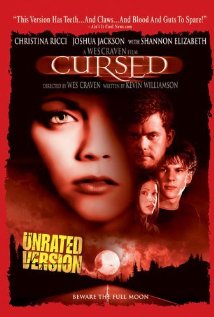
CURSED
US, 2007, 95 minutes, Colour.
Christina Ricci, Jesse Eisenberg, Joshua Jackson, Judy Greer, Portia De Rossi, Mya, Shannon Elizabeth, Nick Offerman.
Directed by Wes Craven.
Cursed is a minor film from Wes Craven. It had many production difficulties, changes in cast, extensive reshooting, re-editing demanded by the Weinstein to get a PG-13 rating. There are inconsistencies in the plot, some holes, episodes left unexplained. However, it is entertaining in itself and is a humorous riff on werewolf stories. The writer is long-time collaborator with Craven, Kevin Williamson. Together they originated the Scream series.
The setting is Los Angeles, a fairground with a fortuneteller who foresees doom. There is also a television station with interviews with Scott Baio. There is an exhibition featuring the highlights of horror stories.
One of the strengths of the film is the performance by Jesse Eisenberg, using his somewhat naive and diffident screen persona to good effect. Christina Ricci is his sister. Joshua Jackson is working on the exhibit but is taken over by a werewolf. Judy Greer is a tough, smart and exploitative producer.
The film relies on atmosphere more than special effects, especially for the werewolf itself.
While there are some serious and scary sequences, there is more emphasis on the comedy and the touches of parody.
1. The work of Wes Craven? His career in horror films and continually re-working the genre? His collaboration with writer, Kevin Williamson?
2. The difficulties in production, changing of cast, re-shooting? The producers wanting a PG 13 rating? The re-editing of the film?
3. The title, werewolf story, in Los Angeles, contemporary?
4. The two girls at the fair, the fortuneteller, their questions, her different responses, who warnings about blood? The disregard? Later in the car, the attack of the werewolf, their deaths?
5. Ellie, her TV work, production, going to the exhibition, the horror emblems? Jake and his work, tired? The crew at the exhibition?
6. Jimmy, his waiting for Ellie, on the road, seeing the accident, trying to help? The dismembered bodies? The werewolf? Bites and scratches?
7. Jimmy, at home, googling werewolves, his having all the theory? His own imaginings and dreamings? Find himself outside naked? Ellie and her taking him in hand?
8. Ellie, meeting Jake, her suspicions, his behaviour and reactions?
9. The interview with Scott Baio, his image of himself, Ellie and her reaction? Joany?
10. Jake, Joany and the attraction, the party, her behaviour? The later attack on her, her death?
11. Jimmy, the reaction of the young men, and joking about his being gay, their brutality?
12. The irony of Bo, the tough man, Brooke and her being his girlfriend, her attraction to Jimmy? Bo arriving at the door, the attraction to Jimmy, confessing that he was gay? His involvement in the adventures? Being saved?
13. Theory about werewolves, in Los Angeles, violence? The appearance of the werewolf – contrived?
14. Jimmy, the scratches, the tendency to be a werewolf? Ellie, infected?
15. The final confrontations, Jake and his interventions, his being taken over? The confrontation with Ellie?
16. The role of the police, interrogations?
17. The tongue-in-cheek approach to the theory of werewolves? The performances in the blend of the series and the comic? The special effects? Variation on the theme?
Published in Movie Reviews
Published in
Movie Reviews
Tagged under
Saturday, 18 September 2021 19:53
Paddington
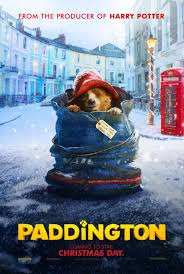
PADDINGTON
UK, 2014, 95 minutes, Colour.
Hugh Bonneville, Sally Hawkins, voice of Ben Whishaw, Nicole Kidman, Julie Waters,Peter Capaldi, Jim Broadbent, Matt Lucas, Madeleine Harris, Samuel Joslin, Matt King, Geoffrey Palmer.
Directed by Paul King.
What a happy and delightful film experience! It all seems just right.
Within a few minutes we are in ‘darkest Peru’, sharing The Explorer’s experience in being saved in the forests by a bear, making the acquaintance of the bear and engaged in conversation with him and his wife and nephew. We immediately accept this – so that there is no trouble throughout the whole film when humans seem to take it for granted that Paddington could speak and engage in ordinary human activities. Although, when he is lost, and the police are given a description including that he is a bear, the London bobby does remark that there is very little to go on!
While Paddington (who has not yet received this name) lives happily with his uncle and aunt (voiced by Imelda Staunton and Michael Gambon), all indulging their acquired love of marmalade, there is a terrible earthquake, destroying their home, and uncle, which means that Paddington’s aunt thinks that it is time for him to go to London where The Explorer had told them they would always be welcome.
Paddington makes his way to England, gets out of the Port of London and waits, after being rudely chosen by the crowds, at Paddington Station, his tag around his neck, waiting for a kind family to find him and welcome him into their home. As the Brown family pass by, father is not particularly attracted by the bear, but mother is delighted. Their daughter, Judy, takes after father with cool disdain, whereas Jonathan, their son, immediately takes a liking to him. And, for what the family could call him, what better than the station that they were at, Paddington?
It is to the great credit of Ben Whishaw that Paddington’s voice is so believable, very pleasant, always polite, even when he gets into a mess. And he fits right in to the family, and gets used to London, West London particularly, as mother and Paddington go to the Portobello Road to try to find out information about the red hat that The Explorer had given the uncle (and Paddington imitates his uncle by always having a marmalade sandwich under the hat in case of an emergency).
The film has a wonderful British cast, led by Hugh Bonneville and Sally Hawkins as Mr and Mrs Brown who fit the roles perfectly.
Mother and Paddington go to the shop run by Mr Gruber (Jim Broadbent). Paddington become something of a hero because he mistakenly thinks that a thief has dropped his own wallet, pursues him in an exciting chase through the streets, and is the cause of the thief dropping all his stolen wallets right in front of the police. Even Judy, at school, is impressed by the students’ acclamation of Paddington, finds that she likes him and can claim him.
There is a very enjoyable episode when Paddington and father go to the Natural History Museum trying to find out who The Explorer really was. The museum is museum-like in its use of those chutes which used to whiz items through in the old department stores. But, not achieving any success, father has to dress as the cleaning lady to get them through security, although delayed by the guard who casts a kind of amorous eye over the lady!
There is a villain. She is Millicent, the granddaughter of The Explorer, who has malevolent motivations for tracking down Paddington, including getting the next-door neighbour, Mr Curry (Peter Capaldi) to help her entrap Paddington, including being let down from the roof, like Tom Cruise in Mission Impossible, to the theme from Mission Impossible! Nicole Kidman clearly enjoys herself as the villain, crafty, imperious, no holds barred.
There is a great deal of farcical and slapstick comedy which fits right in, as well as quite an amount of verbal humour, lots of humorous asides. The initial impression of the British is that they are not welcoming at all and poor Paddington wonders what will happen to him, especially when he writes letters home to his aunt Lucy in ‘darkest Peru’.
While saying it is a nice film, this does not mean that it is a kind of sweet little film. No, it is a strong comedy, a good blend of sentiment and action, which children will enjoy and, indeed, their parents will be very happy to have seen it.
It will resonate strongly with those of British heritage, or those who have absorbed British culture – and it offers in every invitation for everyone to appreciate this very British entertainment.
1. The popularity of Paddington Bear? The books, the children, for adults? Enjoyment?
2. The opening in ‘darkest Peru’, the jungle, the bears, the explorer, his being saved by the bears, their home, the nest in the trees? The revelation that they could speak? The hat given as a gift? Uncle and aunt and the memories of the explorer? His words of welcome to London? The earthquake, the destruction of the house, uncle killed? Paddington going to the port and the boat to England, supported by his aunt?
3. The London settings, the landmarks, the suburbs, the police officers, the Museum?
4. The range of popular songs, Lionel Richie’s Hello? The theme from Mission Impossible…?
5. The screenplay making the situation plausible, the visit of the explorer, his film and its later being discovered, the bears speaking, their love for marmalade, but not soap? The invitation to visit London? The uncle and aunt, their characters, their voices, the civilised lifestyle? The hat with a sandwich for emergencies? The filmmaking as plausible for Paddington to go to London?
6. Paddington and his aunt, getting ready for the boat, the bottles of marmalade, stowing away? Arrival in England, smuggled out of the Port of London? Paddington station, waiting for someone to offer him home, his tag?
7. The Brown family at the station, Father in his pomposity and ignoring Paddington, Mother and her effusion and liking of Paddington? Judy and her disdain? Jonathan and his friendly, reactions? Father feeding Paddington, mess, the taxi and going home?
8. The introduction of slapstick comedy, the cleaning of the ears, the episode with the toilet, shower and bath? Paddington making a mess?
9. Mrs Bird, living in, tying everything, the visuals of the sailor sailors and everything should be ship-shape? Her role in the household, looking after everyone, cleaning up? Shrewd?
10. Breakfast, the beginning of the day, Mary and the promise to go to the Museum to search for The Explorer? Dad and his severity? Judy going to school?
11. Mr Curry, his appearance, looking out of the window, talking, friendship with the Browns? Going to the phone box, finding Millicent, setting up the spy system, his phone call, coded names, Paddington alone in the house, Millicent going to the house, getting up on the roof, being lowered down, her devices to get Paddington? His disappearing?
12. The Geographical Society? The elderly members? The office, the old-fashioned containers and their coming through tubes, the sandwich getting stuck? The Explorer’s details deleted? Father, getting dressed as the tea lady and cleaner, the disguise, the attentions of the security guard, his attraction, the chatter? Paddington getting the information in the office, finding material about The Explorer? Leaving, their being chased, the security guard?
13. The hat, taking it to the antiques dealer, his getting his words mixed up, his background of migration from Europe? The thief, Paddington seeing the fall in wallet, chasing the thief with it, going to action, the chase, the police, Paddington as hero, the article in the paper? Judy and the children seeing him?
Accepting him as a hero, helping him?
14. The flashbacks explaining mother and father, going to the hospital, the hippie clothes and style, Judy’s birth, changing and becoming more respectable, the big car?
15. Millicent, sinister, tough, the dart guns, putting out security? The taxi, interrogating the driver, and in him up and torturing him? The meeting with Mr Curry, their discussions, his attraction, her using him? To give information about Paddington? His finding Millicent in the phone box? Phoning her at her office, her arrival, going to the roof, attached, being lowered down? Her failing to find Paddington? Her efforts and the flashbacks to the Geographical Society, this deletion of The Explorers records, but the family finding the old film? Her determination?
16. The call to Mr Brown, his recognising Mr Curry’s voice, everybody going to the Museum, mother and her investigations into the sewers for her story, Judy remembering, travelling through? Mrs Bird, her drinking with the security guard, the confrontation? Her drinking and distracting him? Mr Brown as a hero – and mother drawing his face into her anonymous picture? Lights off, lights on? Everybody having to flee? The Brown family, the lift shaft, going up to the roof, Millicent and Paddington on the roof, her threats, father trying to save Paddington? Mrs Bird arriving and hitting Millicent with the roof? Paddington distracting Millicent with the back story about the sandwich - and all the pigeons converging?
17. Millicent, the gun, on the roof, her threats, Julie Waters hitting Millicent?
18. Paddington as a character, learning, polite, greeting people, there are ignoring him, his being comfortable with the family, adapting, making a mess and repenting? Writing letters home to Aunt Lucy to describe what happened? His heroism, the danger, his response, accepting situations and using his commonsense?
19. The impact of the visual humour? The wordplay and delighted the verbal humour? And better language? And the satire on the Brits?
20. The film is a fable, has an allegory about how humans treat each other?
Published in Movie Reviews
Published in
Movie Reviews
Tagged under
Saturday, 18 September 2021 19:53
Wallander: Before the Frost
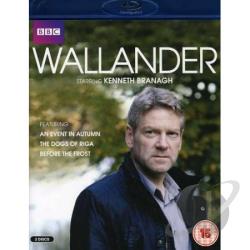
WALLANDER: BEFORE THE FROST
UK, 2012, 90 minutes, Colour.
Kenneth Branagh, Jeany Spark, Mamie Mc Coy, Lindsay Duncan.
Directed by Charles Martin.
Wallander is one of a series of television movies based on Henning Menkel’s celebrated detective, Kurt Wallander. The novels have been translated and published all around the world. They have a certain grimness about them, the rather world-weary character of Wallander himself, his relationship with his father, an artist who is experiencing dementia, alienation from his wife, the difficult relationship with his daughter. However, this film has a much more cheerful Wallander, anticipating the birth of his daughter’s child.
The film uses Swedish locations very effectively and creates the mood of Scandinavia. Kenneth Branagh is very good in the role, one can empathise with him and his feelings of depression, being overwhelmed, but much more genial here.
1. The popularity of the Wallander series? Kenneth Branagh in the title role? This is the ninth film?
2. The quality of the series, set in Sweden, filmed in Sweden? Drama, crime, mystery? Personal story?
3. Kenneth Branagh as Wallander, age, appearance, his being an interior man, morose, strong sense of duty, dedicated and relentless, his work as the superior officer, severity, his skills in detection, confrontations?
4. Audience understanding of Wallander, his detective work, the past with his marriage and its collapse, the tense relationships with his daughter, Linda?
5. This film as a more cheerful film, at work, his relationship with his daughter, helping her, her pregnancy? Going to the scan with his daughter? The joy of being a grandfather?
6. The Swedish settings, cold, home, police officers? The woods? The musical score?
7. The swans, the arsonist, setting fire to them, seeing them fly on fire? The finding of the Bible, the apocalypse? The woman, the accident of her being in the woods, her concern, her being murdered, buried?
8. As a story, the friendship with Linda in the past, while denying her? Her religious father, madness, his leaving? Anna and her relationship with her mother? Wallander going to see her, discussions with her? The husband leaving, returning, his hold over Anna, her disappearance? The family gathering, the table, the discussion? The interviews with Monika? The table and the talk, the challenge to Anna’s father, reactions?
9. The staff, the investigation of the fire in the forest, the swans, the murdered woman? Her family and having to break the bad news? Grief?
10. The swans, the man from the institution, religious motivation, his killing, setting them on fire? Apprehension?
11. Linda, the previous antagonism towards her father, her getting married, the news of her pregnancy, the visit to the clinic, the ultrasound?
12. A minor story, the solving the mystery, Wallander less morose, happier, his future?
Published in Movie Reviews
Published in
Movie Reviews
Tagged under
Saturday, 18 September 2021 19:53
Folies Bergere/ Paris Folies/ La Ritournelle
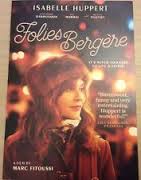
FOLIES BERGERE/ PARIS FOLIES/ LA RITOURNELLE
France, 2014, 98 minutes, Colour.
Isabelle Huppert, Jean- Pierre Darrousin, Michael Nyqvist, Pio Marmai, Marina Fois.
Directed by Marc Fitoussi.
Because Folies Bergere is so well acted, it might give the impression that it is deeper than it actually is, screenplay at least.
No, it is not that Folies Bergere some of the action does take place in Paris (and the original title of the film is, in fact, Paris Folies). Rather, it is the kind of madness, folie, that goes through the middle aged heart and mind, wondering about a marriage, daring to test out the reality with the risk of temptation.
The setting is Normandy, a farm with the raising of cattle, beautiful and large white cattle, which we see parading in a competition as the film opens, with Xavier (Jean- Pierre Darrousin, always a fine actor) standing by his bull and hoping that he will win. His wife, Brigitte (Isabelle Huppert, always a fine actor as well), combing the bull, suggesting it wear a tiara if it wins, though she puts on the tiara for the celebratory photo. We are plunged into the countryside, the difficulties in the marriage when Xavier is always making comments about his wife and her behaviour. She has developed a psychosomatic rash and in a more than rash judgement, she decides to go to Paris to consult a doctor (whom Xavier phones and discovers has not been in practice for some time).
A different way of life is suggested by the young people who come down to celebrate a loud party next door to the file, while some of them do come across to look at the birth of a calf, not their ordinary experience. One of the guests is Stan hello thank you, a man of about 30 who is attracted to Brigitte and invites her to the party. She does go, but finds it too loud, but takes his address in Paris.
This is to be a two-day holiday for Brigitte, freedom from the farm, from her husband, from a life that she has lived but is unsatisfactory.
The meetings with Stan and outings are not all that they are expected to be, especially when she finishes up having to babysit two youngsters – and then disappears again, leaving her mobile phone, visiting Stan’s shop to recover it, much to his displeasure.
While she enjoys the sites of Paris and its atmosphere, she is smoking outside her hotel room when the alarm goes off, not for her, but for a Danish visitor, Michael (Michael Nykvist, also a fine actor). He is something of a charmer, with a wife, though not strongly attached to her it would seem. Brigitte goes out with him, finds the tourist wheel rather queasy, enjoys a show, but then has to have dinner with her sister-in-law, with Michael sitting down beside them, pretending not to know French or understand the insults she is piling on him.
As might be expected, Xavier comes to Paris, sees his wife, is dismayed. But he does go to visit his son who, against hopes, is training to be an acrobat. Xavier is impressed with his performance and bonds with his son again.
After the trip to Paris, with wise words from his assistant at the farm, Regis, the couple go over to see a dyspeptic bull – and the conversation, realism about the bull, but really an allegory about themselves, means that they have to come to terms with themselves and their marriage.
(Someone who was impressed with the film thought it was the new version of Madame Bovary – which it may be, but that is giving it too much status for its rather likeable, even pleasant, exploration of middle age and marriage.)
1. The various titles? The emphasis?
2. A French story, tone?
3. The Normandy settings, the cattle, the farms, home, the countryside?
4. Paris, the landmarks, romantic images, the hotel, the river, the tourist wheel, the show and performance, restaurants? The songs? Score?
5. The cattle show, the competition, Xavier parading his ball, very serious, Brigitte, combing the bull, the comment about the tiara, taking the photos, poor photos, winning, her wearing the tiara? The scenes of work, Regis and his helping on the farm? The birth of the calf, the difficulties, the young people from the party watching?
6. Saviour and Brigitte, their long marriage, tensions, his critique of her behaviour, the visit of the son, the response to his training to be an acrobat? Brigitte and her rash, the discussions about it, the neighbours and the meals and their conversation? Life in the provinces?
7. The young people, the party, Stan and his avoiding the party, talking with Brigitte, inviting her to come, the dancing, her suddenly going home, his address?
8. Brigitte and her decision to go to Paris, the false appointment, the discussions with her sister-in-law? Going to the hotel, going to Stan and his shop, meeting him, the babysitting, her going to the house, the children, the pot, the effect on her, leaving without notifying him? His later reaction to her, indignant? His having her phone and her getting it back?
9. Seeing Michael, smoking, the alarm going off in his room, explaining that he was Danish? His charm? Inviting Brigitte out for a walk, going to the wheel, her apprehension, being sick? Enjoying the show? Crossing the street through the traffic?
10. The meal with her sister-in-law, Michael sitting at the table, hearing everything, the rude comments of the sister-in-law and then Michael speaking in French?
11. The return from the outing, going to Michael’s room, her decision, the sexual encounter, his infidelity to his wife? The effect? Going to the conference, his giving the talk? Brigitte watching him?
12. Xavier, the effect of Brigitte going to Paris, the phone calls, discovering her lies about the doctor and the appointment? His going to Paris, seeing Brigitte with Michael, watching them on the bus, the effect as he sat by himself? The challenge to him?
13. The decision to visit his son, amazed at his acrobatic skill, bonding with his son?
14. Brigitte, going home, the train, Xavier collecting her?
15. Regis, his reassuring Xavier, reminding Xavier of his infidelity? Affirming that each loved the other?
16. The return home, the difficulty with the bull, the discussion about Big Jim and Bora Bora, the analogy with Brigitte and Xavier, in each other’s company,
the reconciliation?
17. The suggestion that this is a 21st century version of the Madame Bovary story?
Published in Movie Reviews
Published in
Movie Reviews
Tagged under
Saturday, 18 September 2021 19:53
Rise/ 2014
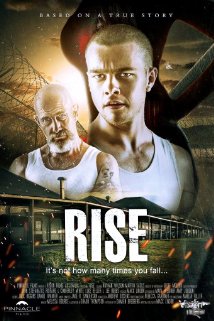
RISE
Australia, 2014, 104 minutes, Colour.
Nathan Wilson, Martin Sacks, Marty Rhone, Mack Lyndon.
Directed by the Mack Lyndon.
The title Rise does not give anything away. It is only halfway through the film when there is a background song is introduced, Rise, a song whose lyrics have a spiritual dimension, indicating that no matter how down people are in life, there is or is the possibility that they can rise.
Rise is an Australian small-budget film based on a true story, a story experienced by the writer-director, Mack Lyndon, himself in 2008. He has created an uncomfortable story out of his experience, an accusation of rape, his being found guilty in his trial and his going to prison. Any story about rape makes for uncomfortable viewing. The difference with this film is that it is all seen from the point of view of the accused, nothing from the point of view of his accuser, a fight for innocence in the an appeal to the courts. Because courts have been far less sympathetic towards victims of rape in the past and there is a ground swell of sympathy for injustice for accusers, and newspaper headlines frequently offer stories of accused who are either found not guilty or receive a penalty which advocates for women who have experienced rape think far too lenient. (One of these comes to visit the accused in jail, talking of an appeal to the courts for him to receive a stronger sentence.)
That having been said, the film is very much a prison film, in the tradition of those films, but, on the whole, it is a far less melodramatic picture of prison life than usual. Not that there are not some bizarre characters, responsible for violent crimes, and some guards who are certainly anti-prisoners.
During the first ten minutes or so of the film, we see Will as a little boy, impressed by a sign on a bus that urges everyone to be kind. He grows up to be a nurse, a caring professional, who has a night out on the town, clubbing, meeting up with a girl, going back after drinking and having what he considered a consensual sexual experience. He is very much surprised when the police arrive at his house, interrogate him, cuff him, charge him.
Nathan Wilson, in his first role, proves to be a sympathetic Will. He suffers the usual indignities of going into prison, being assigned a cell, rubbing up against tattooed toughs, advised not to tell fellow prisoners why he is in jail for fear of reprisals. While he has some difficult times, even with a visit from his rather hysterical mother, he adjusts to prison life, makes friends, especially a disabled life-prisoner (Marty Rhône) and is assigned to care for, and an old veteran, 26 years in jail for armed robberies, who takes Will under his wing and has something of a conversion experience himself. There is his cell-mate, Baxter, played by the directo, Mack Lyndon himself.
But then, the film moves to a religious dimension, one of the prisoners, George, being devout, giving Will a religious book, engaging in conversations, going to the services provided by the prison chaplain. Will himself becomes a man of faith – always in a somewhat low-key Australian style – but becomes more confident, prays, has faith that his friend, who has enlisted the help of a high-powered barrister, will be able to get his conviction overturned.
When the film becomes more overtly religious, and with the title song, Rise, it seems to be in the vein of a number of films from the United States, made by Christian groups, backed by Christian churches, especially those made by the Kendrick Brothers, Courageous, Fireproof. (The final credit of this film name Elevation Church – which has its own websight.) Because the religious element is generally low-key, secular Australian audiences might be able to accept it more readily than they do the American versions.
In most ways and technically, the film is very straightforward. Nathan Wilson pleasantly convincing as Will – and, when he smiles, he could pass for a younger version of Matt Damon. Veteran, Martin Sacks, is the old prisoner who befriends Will and is influenced by him for the good.
Which means that the film is very earnest in its way, making the case for justice for a man accused of rape affirming that he was innocent. There is a final moment when Will and the woman who accused him walk past each other and look at each other, with Will having made effort to be forgiving.
1. The title? New life? The religious meaning? The song and its place in the middle of the film?
2. An Australian story, true story, characters, flavour?
3. The introduction to William, the memories of kindness and the advice from the past? His life as a boy? As an adult? Going into nursing, the quality of his care?
4. The party, drinking, drugs, his date, the dancing, the attraction, her boyfriend and her irritation with him, spending the night, sexual encounter, her disappearance, the arrival of the police and his arrest?
5. The case, accused of rape, public opinion about women and victims? The animosity towards men, William and his protesting his innocence? His lawyer, his friend, the discussions?
6. The judge, the evidence, the testimony of the girl?
7. William and his being found guilty, going to jail, the typical entry and experience, his cell, the details of prison life?
8. Jimmy, prisoner, the range of crimes, over 26 years? In prison, his influence with the others, friendship with William, his conscience, the religious influence, William’s support? Jimmy and his attitudes, the issue of pleading guilty or not, his following William’s advice, the interview with his mother, his gratitude and experiencing freedom?
9. William, his age, experience, experiencing prison life with difficulty, the usual types of prisoners?
10. The visit of his mother, her hysterics and his not wanting her to come?
11. The visit of the woman who was wanting a plea – for a longer sentence, her stances against men?
12. His lawyer friend, the phone calls, the possibilities for appeal? The friend going to the expert lawyer, their discussions? The visit to the prison, believing with him, the judge and his hostility?
13. George, his being in prison, religious, the book, the Bible, the chaplains and the services, the prayer groups? William caught up in this religious atmosphere? Convinced?
14. William, principles, an attempt at integrity?
15. The danger, his being provoked, the fights, the guard, the protection, helping him to be ready for the appeal?
16. The court, the difficulties of evidence? The idea, the deadline, the lawyer going to the expert, the issue about drugs, potency of drugs – and his being
found not guilty?
17. His seeing the girl after the court case, passing on the street?
18. The religious dimension of the film, a spirit of evangelism?
19. The film based on the true story as experienced by the writer-director?
Published in Movie Reviews
Published in
Movie Reviews
Tagged under
Saturday, 18 September 2021 19:53
Alexander and the Terrible, Horrible, No Good, Very Bad Day
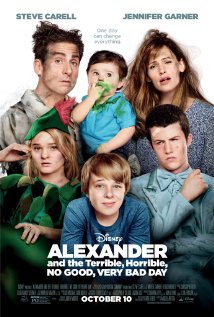
ALEXANDER AND THE TERRIBLE, HORRIBLE, NO GOOD, VERY BAD DAY
US, 2014, 81 minutes, Colour.
Steve Carell, Jennifer Garner, Ed Oxonbould, Dylan Minette, Kerris Dorsey, Bella Thorne, Meagan Mullally, Jennifer Coolidge, Dick Van Dyke.
Directed by Miguel Arteta.
They say that films with very long names turn out to be not very good. It is difficult to know who “they” are – but in this case, they are quite wrong. Alexander definitely has a terrible, horrible, no good, very bad day but it is not a terrible, horrible, no good, very bad film.
It’s a family film, generally for family audiences but also about a family. At the opening, we see them struggling home in a knocked-about car. They unlock their front door and we, and they, hear what seem to be crocodile noises! And then the film goes back 24 hours so that we can discover that very horrible day.
Alexander is quite an enterprising young man, although he certainly gets himself into a mess and get the family itself into quite some messes as well. Surprisingly, he is played by Ed Oxennbould, and very well too. But the surprise is not his acting. It is that he is an Australian actor and is to appear in the family film, Paper Planes. He is perfectly convincing as an American. Although it is interesting to note that in the film, his character, Alexander, has a passion for things Australian, his room covered in posters, his wanting to do a project on Australia at school (though his arch-rival, always putting him down, Philip Parker, and popular with everyone is assigned Australia).
Alexander has interesting genes because his father is a rocket scientist, recently losing his job as companies are re-structured, but offering to work on a computer game for a group of young experts. He is played genially by Steve Carell. And mother, Jennifer Garner, is very successful as well. She writes children’s books, testing them out at home with great approval. When she goes to the library bookshop reading of one of the other books from her company, they discover there is a horrible, very bad misprint right throughout the book, dump instead of jump! Which leads to some difficulties – and some hostilities – for the guest reader, Dick Van Dyke.
Alexander has an older brother and sister. Anthony (Dylan Minette) is preparing to go to the prom with, of course, the beautiful girl in the class (in who in fact is a snob that no one would want to go with). He also get has to get a suit – and find one that does not suit him. And it his driving licence test day – with a tricky examiner concerning mobile phones, Jennifer Coolidge. He has an older sister, Emily (Kerris Dorsey), who has been rehearsing for the school play – she is Peter Pan, but develops a cold, gives into too much cough mixture with a few ‘high’ disastrous results.
So, we can see, what a terrible, horrible day the rest of the family has – except the baby Trevor who does suck on a colour marker with green results. But, the rest of the family seem to give all their attention to the baby – and poor old Alexander feels that everybody neglects him.
It was important that this review to give the initial attention to Alexander because of his feelings of neglect – rather than to the rest of the family who, despite the terrible day, do finally have good results.
And then there is Alexander’s birthday party, quite a surprise with a very Australian theme.
All’s well that ends well – and this amusing film, with a moment or two of rudeness, runs only 80 minutes, which is all to the good.
1. A popular novel? Film conversions? Animation? Life-action? Characters, styles, idiosyncrasies? Situations, accidents, comedy? A film for all the family?
2. California, the family,, the rooms, close living? The office? Books, videogames? Shops, the pharmacy, school, class, laboratories? Playing? The streets written final party? The Australian atmosphere and interests?
3. The film, we, the musical score?
4. The title, the focus, the emphases? The opening, family, in the car, Alexander and his being to blame, open house door in the crocodile sound?
5. Going back in time, the audience identifying with the family, their problems, the behaviour, clashes, love, the parents attention away from Alexander, is feeling that he was ignored? The disasters, the family together, happy, affirmation, survival?
6. Then, the father, rocket scientists, his being retrenched? His having to be father-mother, traitor and his first word? The meals, genial life, cake? Picking it up? Kelly, loving wife, who job, the importance, the Times and the pressures, her boss? Anthony, the damage to the car, Lilly, coffee, the performance, the cough mixture? Baby Trevor, the colour and the green about his mouth?
7. The crisis, the play, the rehearsal, Peter Pan, the fire, Emily, mixture, being sick?
8. Guardian the party, Alexander and his fascination with Australia, the design of this room, the party, the animals on the range? The men from down under, performance, strippers – and the advice to be PG?
9. Kelly, mother, for children, love, affirming them, Alexander feeling he was ignored, running late for work, Anthony in the shower and his embarrassment? Nina, the pitch for the book, the promises, the significance of the misprint, Dick Van Dyke and his reading, his reaction to Kelly, going viral on You Tube? The party, phone call, the success of the book despite the misprint?
10. Alexander 12, first impressions, school, Australia, Philip Parker and his rivalry, everybody gained his party, Alexander and the girl and her decision? Helping the lab, by, having to mind beginning? His father late? The photos and mockery, ignored? Have call, the break, taken the wish, skating? Is its, and is called, school, Philip Parker and chickenpox, everybody going to his party? His blame himself? Watching the play, the fiasco? His final and session, everybody let him off? The happy party?
11. Anthony, his age, the blue suit, senior, the moods, going to the prom, and you, the phone call? His embarrassment in the shower? The banking Johns said? The driving test, is going to slowly, examine and her drinking him with a? See you in talking, the accident with, the blue suit, going to play, collecting Celia, reaction, the Japanese restaurant, looking down, her friends there? Anthony’s not wanting to break with his family?
12. Emily, the play, rehearsals, cold, the director, copying and drinking the medicine, the plane crash, survival? The family, singing the sea?
13. Celia, snob, the phone calls, the break after Anthony serves as if he was insulting her, instead of talking to Alexander? The reconciliation, the dress, the blue suit, in the music, in the car, the music and singing, the Japanese restaurant?
14. Anthony and his friends?
15. The range of comedy, farcical, slapstick?
16. Family entertainment about the eccentricities in the family?
Published in Movie Reviews
Published in
Movie Reviews
Tagged under
Saturday, 18 September 2021 19:53
Lash, The
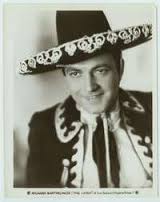
THE LASH
US, 1930, 77 minutes, Black and white.
Richard Barthelmess, Mary Astor, Fred Kohler, Marian Nixon, James Rennie, Robert Edeson.
Directed by Frank Lloyd.
The Lash is an early sound film, with many captions and some awkward staging of scenes indicating the origins in silent film.
Audiences watching old California after the separation from Mexico and the role of Spain will be reminded, of course, of Zorro. And there is a touch of Robin Hood.
The introduction reminds us of the situation between the old Mexicans and the inhabitants of the new State of California. There is significant prejudice against the Hispanics and profiteers trying to take over the lands. This film focuses on a family, a rich don and his niece, and his young nephew, Richard Barthelmess, returning home after four years of study in Mexico City. The young man, Pancho, is upset by the attitudes of some of the Californians. To keep the peace, his uncle gets him, along with his associate, Juan (Arthur Stone), to take several thousand head of cattle north.
Harkness, a politician and an exploiter of the Mexicans, fights with Pancho. A sympathetic Sheriff, Howard (James Rennie) breaks up the fight.
Pancho decides that he will confront the Californians and forms a group, calling himself El Puma. They cause chaos, robbing and upsetting the locals. In Los Angeles, a small pueblo, the American agents hire the good-natured sheriff to hunt down El Puma. In the meantime, the sheriff has visited the hacienda and fallen in love with the niece.
There are some complications, Juan, in trouble with the law because of his attack on his wife, Pancho falling in love with a Señorita, Mary Astor, who is willing to follow him everywhere.
There is some spectacle in the cattle driving as well as the raids by El Puma and his gang.
The film looks rather antiquated now, but it is a reminder of the popularity of this kind of story and filmmaking at the beginning of the 1930s.
Published in Movie Reviews
Published in
Movie Reviews
Tagged under